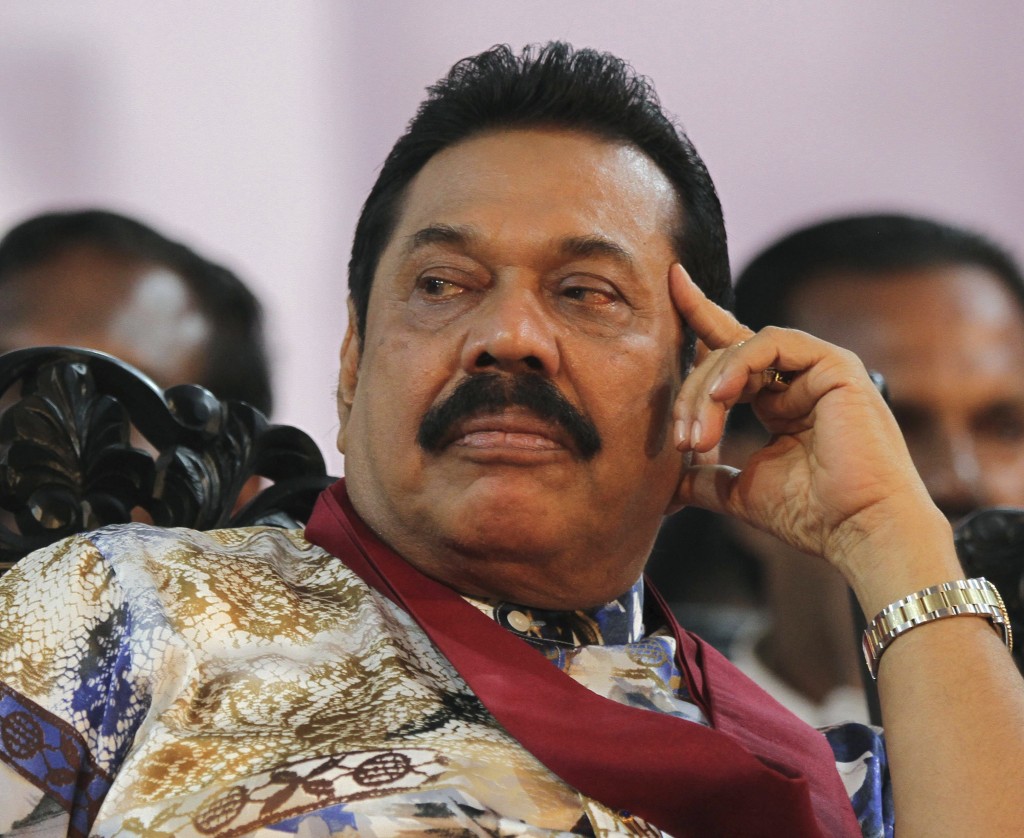Photo by AP Photo/Sanka Gayashan, via Japan Times
A slogan from one of Mahinda Rajapaksa’s campaign websites for tomorrow’s election reads, “Let’s start afresh”. Looking at it harder, the slogan is as audacious as it is insulting. When you strip away its optimistic posturing, the slogan’s meaning becomes clear: Just imagine the former president, as he sheepishly sweeps his mess under a carpet, saying, “I might’ve made a mistake or two. But let’s just forget about it and go back to being friends. And you know what? We don’t even need to mention it again.” Whether you acknowledge it or not, an extremely reluctant request for forgiveness (and many other things) is implied in the slogan. But the thing is, as T.S. Eliot poses in “Gerontion”, “After such knowledge, what forgiveness?”
What the man and his lackeys have done is hard to forgive (and forget). We know the story all too well. For an unashamedly solipsistic political project, Rajapaksa purposefully obscured the boundaries between the trias politica, quelled dissent, created a police state, rewarded the political underbelly and gave succour to Sinhala majoritarianism. What use were reconciliation and a political solution, when the empty rhetoric of equality and peace could be forcefully shoved down our throats? Rajapaksa’s regime made its opponents cower and forced minority communities to put up and shut up. All of this–along with the renewed vigour behind Sirisena’s candidacy-led to January’s electoral volte-face. But, hey, let’s put the oppressiveness and ugliness of Rajapaksa’s nine years aside, let’s forget that he was rejected at January’s presidential election and let’s simply “start afresh”.
Lackaday. It’s more like starting rotten when you consider the putrid stench of worm-eaten garbage that Rajapaksa and the UPFA are talking about. In the lead up to this election, the former president has manipulated the insecurities of his supporters, reminded everyone that they owe him (for the end of war, for victory, for safety and for development) and stoked communalism (for which President Sirisena admonished him). Imagine that–a national political campaign that pits our communities against each other and talks about the few successes of a very troubled past. Did Rajapaksa win the war to simply go down this sordid and eerie path?
According to the full inventory of his presidency–yes. There is nothing new or surprising here. Just watch Rajapaksa’s recent speeches and interviews to understand how the most celebrated wartime president slithers back, thumbs the pages of a shop-soiled playbook and spews out what we have heard for the last nine years. It’s an old script, read repeatedly–the threat against national security, the wide jaws of a baleful international community, the need for development (because only he can take loans and construct highways) and the prospect of separatism (because the Tamils and Muslims didn’t vote for him and ipso facto they are separatists who will be entertained by the F-word-loving UNP). Rajapaksa is still fighting instead of engaging in a politics of revision. This is now, after war and after an ear-splitting slap in the face at January’s election.
But perhaps it’s unfair to expect a pit bull to be a guide dog. After all, Rajapaksa is a one-dimensional fighter. Like most of us, Rajapaksa interfaced with the threat of an enemy and the politics of war for much of his life. The fear of annihilation provoked hatred, entrenched insecurities and spurred the offensive effort to protect the nation. His objective is to conquer. In matters of government and state, his perspective dominates, and all internal and external contests that arise are fought and won through a process of attrition. At any given point, Rajapaksa creates a front and maintains it against real or imagined enemies. His supporters and defenders (like the serpentine Wimal Weerawansa and Dinesh Gunawardena) create the same fronts and see only one way to uphold our country’s sovereignty–a stubborn no-holds-barred fight to the finish. One side wins, the other loses (like any good primitive attempt at blood-letting and victory). The victor dictates, the conquered listens. This is precisely why Rajapaksa has always done well in times of crisis, particularly when there is enough space to articulate an “us vs. them” proposition (the fight against the LTTE, the international community, the UN and the TNA). He has neither done well in times of stability nor shown his ability as an honest conciliator and peace builder. The battle for victory and power are his safe spaces, which is the reason why his leadership was necessary to win the war.
It’s also the reason why Rajapaksa’s leadership isn’t necessary now. Unlike war, the context of peace is not suited to one-dimensional fighters; instead, it needs selfless fighters who are also healers and sages (like President Sirisena). Rajapaksa and his closest comrades are none of these. As preceding paragraphs have shown, they are the architects of an abominable period in our country. When beleaguered civil society leaders, politicians and activists marched for reconciliation, justice and democracy between 2009 and 2014, they always found a snarling lion in their path. Tragically, it’s the same lion that still leads the previous order–a solitary symbol of pride and aggression–and as he did after the end of war, he will once again stand in the way of a just peace and an open society (if the UPFA wins tomorrow).
It’s pretty simple then–vote against, ridicule and dismiss with contempt a campaign that quite menacingly comes down to power hunger and ego and hate. Perhaps more than anything else, just say “no way” to the men and women who try to threaten the hope and opportunity we have today, and let the rest of T.S. Eliot’s stanza guide you:
“After such knowledge, what forgiveness? Think now.
History has many cunning passages, contrived corridors
And issues, deceives with whispering ambitions,
Guides us by vanities. Think now
She gives when our attention is distracted,
And what she gives, gives with such supple confusions
That the giving famishes the craving…”
